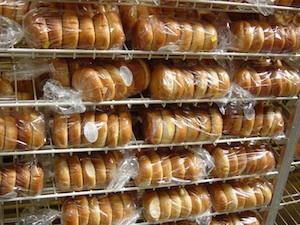Bakers group happy to win exemption from food safety law
 As the Food and Drug Administration prepares to issue final regulations to enforce new safety laws, the American Bakers Association is supporting the agency for giving it an exemption.
As the Food and Drug Administration prepares to issue final regulations to enforce new safety laws, the American Bakers Association is supporting the agency for giving it an exemption.
But the official comments the ABA filed Monday about the exemption many of its members' warehouses will get from the new safety laws amounted to a pat on its own back: As Sunlight has reported, the trade association lobbied long and hard to get language exempting facilities that store packaged food from regulation under the bill.
The ABA's success in getting the exemption illustrates how powerful interests work to get beneficial changes to laws in highly technical arenas.
The major trade organization representing the baking industry, the ABA has reported spending more than $200,000 on lobbying since 2009, when Congress was considering the Food Safety Modernization Act (FSMA). The group was successful in convincing Congress to include key language, including the phrase "facilities solely engaged" in the bill, which gave authority to the agency to create such an exemption.
After the law was passed, Covington & Burling attorney Miriam Guggenheim helped the group file a citizen petition with the FDA asking that the agency grant the exemption. The FDA then included the language in its proposed rule issued in January 2013.
Because of loopholes in lobbying disclosure laws, Guggenheim does not register as a lobbyist for the group; however, FDA meeting logs obtained by the Sunlight Foundation show that she is a major force representing the food industry before the agency.
The ABA's comment letter applies to a proposed rule on "preventive controls for human food," one of several proposed implemented rules implementing the food safety law. The agency has extended the comment period several times for the rule, first because of lobbying by food industry groups, and again last week because glitches in the website Regulations.gov were preventing people from commenting.
The reasoning behind the exemption is that warehouses that only store food, as opposed to processing it, are not at high risk for contamination. One example: Bread put in a package and then sent to a warehouse, which then holds it before sending it on to a store. The warehouse would still be subject to regulation by the FDA, but would not be required to comply with new requirements under the FSMA.
However, the Washington-based food safety group Center for Science in the Public Interest points out that sometimes contamination can occur even with packaged food, depending on what kind of materials are used in the wrapper.
"We are concerned that the rule does not adequately define terms in its exemption for storage of food that is not exposed to the environment," wrote the group in its own comment letter. "The final rule should specify that the phrase "not exposed to the environment"…means packaged with food grade material that is impermeable to outside bacteria or other contamination."
To read more of Sunlight's reporting on implementation of the Food Safety Modernization Act, click here.
Follow FSMA proposed rule's with Sunlight's Docket Wrench tool by following the links below.
Follow proposed Food Safety Modernization Act regulations on Docket Wrench
- Food processors. Requires food processors to have written food safety plans, sets out other requirements for safe processing. Comments due November 22.
- Food growers. Establishes science-based standards for growing, harvesting, packing, and holding produce. Comments due November 22.
- Foreign suppliers. Requires importers to verify that food meets same level of public health protection as that required of domestic food producers. Comments due January 27, 2014.
- Third party accreditation. Establishes a program to accredit auditors to conduct food safety audits and certify foreign facilities as meeting food safety standards. Comments due January 27, 2014.
- Animal consumption. Establishes preventive controls to ensure that commercial food for animals, including pets, is safe. Comments due February 26, 2014.
Under review by Office of Information and Regulatory Affairs–not yet published for comment
- Intentional adulteration. Protect food supply from sabotage, terrorism and other intentionally harmful attacks.
Under development at FDA
- Sanitary transport. Sets standards for safe transport of food.
(Photo credit: iStockphoto.com)

